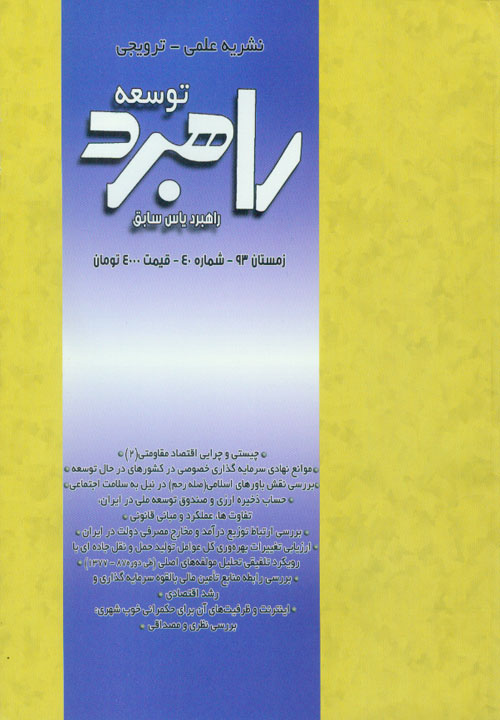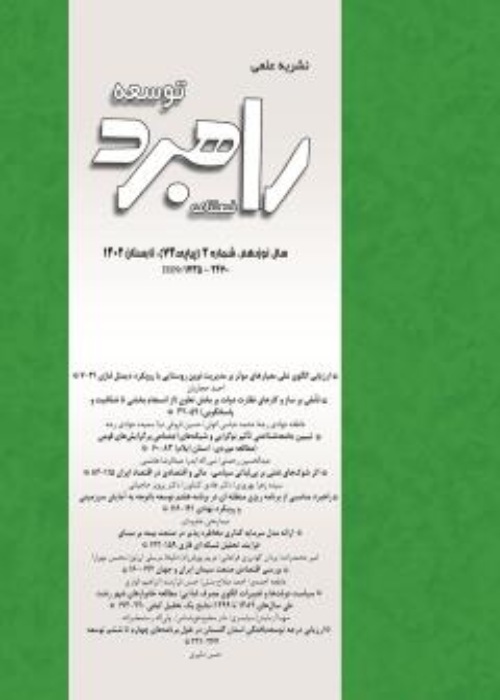فهرست مطالب

نشریه راهبرد توسعه
سال دهم شماره 4 (پیاپی 40، زمستان 1393)
- 198 صفحه، بهای روی جلد: 40,000ريال
- تاریخ انتشار: 1393/12/10
- تعداد عناوین: 9
-
-
صفحه 5
-
Page 30Governance institutions are part of the investment climate of a country. Good governance institutions are viewed as reducing economic uncertainties and as promoting efficiency. This paper empirically shows that the quality of governance is an essential determinant of the private investment decisions in the developing countries by stressing the existence of different types of possible measures of governance. We use three different indicators to measure the quality of governance, Quality of Administration, Political Accountability and Political Stability. Indicators were proved to be significantly –although at different levels of significance and magnitudes of influence- contributing for private investment decisions. In particular the low level of political accountability has been an influential factor which has been holding back the region from reaching its private investment potential. Findings are robust to the introduction of other explanatory variables: structural reforms – in the form of trade openness and financial development- and human capital in particular.Keywords: Private Investment, Institutional Factors, Structural Reforms, Developing Countries
-
Page 46Nowadays the need for access to welfare and social perfection requires a healthy and vibrant community. Public health officials, and members of any society is the ultimate goal of all health and Public health cannot be found in a society free of corruption. In other words, as long as the deviations and the desire to escape the lower social class it can be argued that the path to health and happiness. On the other hand, it has been proven today there are the relationships between belief in the teachings of God and some positive social parameters. So in this article we want to investigate based on the approach of sociology to analyses relationship as one of the teachings of Islam and its role in the desire for social welfare and health then we are mention some of the factors affecting the realization of the divine duty to be social. To examine this issue, the concept of relationship review is etymologically and types and the following provide theories of deviance and illegality and in final characteristics of the relationship between characteristics of the deviations and the deterrent doctrine were investigated.Keywords: Lifestyle, Mental Health, Social Health, Religiousness
-
Page 75Oil Stabilization Fund (OSF) has been created in Iran’s third and fourth development plans to invest part of Iran's oil revenues and act as a stabilizer against fluctuating oil revenues. Although OSF has two mentioned rules, in practice, more than 90 percent of OSF resources were allocated to government projects and less than 10 percent was lent to the private sector. After unsuccessful experience of OSF, National Development Fund (NDF) has been established only to invest part of Iran's oil revenues and OSF act as a stabilizer against fluctuating oil revenues. Natural resources, theoretically, are consider as intergenerational wealth. So any exploitation of these resources must be determined based on the optimization of periodic social desirability. Considering this rule, per capita wealth of the people during time should remain constant. Then when life of resources ends, we will have wealth equals present value of oil and gas wealth in financial assets. Adherence to this principle requires that part of revenues from oil and gas should be invested in National Development Fund. The success of NDF and optimal management of oil and gas revenues in Iran depends on modifying the government organizational structure and its financial behavior.Keywords: Oil Funds, Natural Resource, Intergenerational Wealth, Iran
-
Page 108Recently, Inequality and unequal distribution has been of a great importance to economists. In the present study, the main question is that whether or not there is a significant relationship between the variable income distribution and government consumption expenditures? In the observing model, does the virtual war variable make sense in government consumption expenditure and income distribution? This study, with regard to the virtual war variable, examines the relationship between income distribution and government consumption expenditure during the 1389-1357. In order to estimate this relationship between Ma and Koenker(2006) model, a system of simultaneous equations and a three-stage least squares method is used. Besides, the tests used in this study are the unit root test of P hillips – Perron. According to the estimation results, the estimated coefficient of government consumption expenditure is approximately – 0.042. The first model represents that there is a logical relationship between virtual war variable for income distribution and income distribution variable.Keywords: Income Distribution, Government Consumption Expenditures, Simultaneous Equations, Three, Stage Least Squares Method
-
Page 125Typically, Two Parametric and Nonparametric methods are used for calculating Total Factor Productivity (TFP). One the famous nonparametric method is Tornqvist index. In this method, which is based on linear programming especially Data Envelopment Analysis, TFP of one DMU is evaluated during a specific period using some inputs and outputs. In this paper, TFP in road transportation sub sector is evaluated by using Tornqvist index. However, one of the assumptions of this method is that three multiplied by total sum of inputs and outputs should not exceed the number of DMUs. The results show that average technical and technological efficiency and TFP growth are equal to 0. 94, 0. 988, and 0. 932 during period 1377 to 1387, respectively. Also, TFP growth in this sub sector in all considered periods except two periods is negative.Keywords: Total Factor Productivity, Tornqvist Index, Principal Components Analysis, Road Transportation Sub Sector
-
Page 144Financing sources of investment has relationship with economic growth, so that the Finance resources and investment theories, investment and financial sources have been introduced of the most important condition for economic growth, while the theories of economic growth main reason for the investment and financial sources are economic growth. This study examines causality between sources of investment potential finance and economic growth during the period 1990-2011 for three countries Iran, Turkey and Malaysia, by using the Toda and Phillips methods and adjusted Vector Auto Regression (VAR) model. Paper results indicate that: in some cases, domestic savings due to economic growth and in other cases, economic growth due to domestic savings. Long-term loans, FDI, public guaranteed debit due to economic growth in Iran. Short-term loans and foreign capital are causes of economic growth in Turkey. Short-term loans and Public guaranteed loans are causes of economic growth in Malaysia.Keywords: Financial Resources Investment, Economic Growth, Causality Test
-
Page 166In the era, that we see the accelerated growth, complexity and increasing of crisis in urban societies, exercise the one way and noninteractive approaches in urban management isn’t responsive, so using of interactive management approaches have been necessitated much more than past. In this article, the main hypothesis is that, internet and cyberspace can impact on good urban governance with the most capabilities such as E-mail, websites and so on for quick informing and information exchange, that’s most indices, consist of: increasing legality, transparency, citizen participation, responsibility and survailibility in municipalities for citizens. In this article, the authors try to explain the impacts of internet on possibility of good urban governance by experimental and theoretical method, conceptual modeling and explaining the successful urban governance experiences in Netherland and South Korea, of course, the experiences in South Africa and turkey were not successful.Keywords: Urban Good Governance, Internet, Netherland, South Africa, Turkey, South Korea


